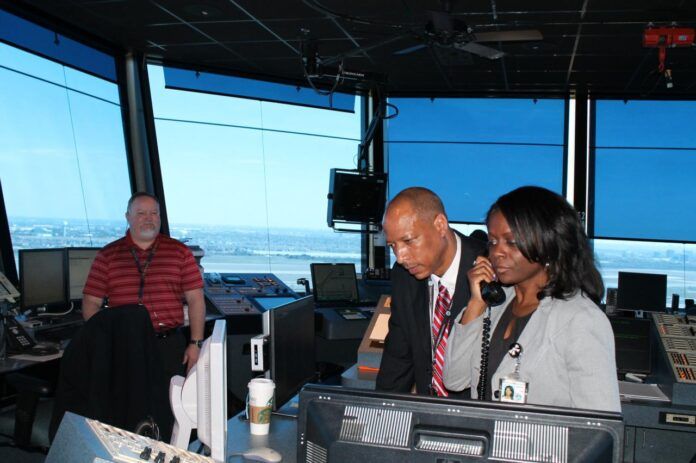The National Air Traffic Controllers Association says it wants to take part in the oversight of a new training process for some prospective controllers under changes announced last week by the FAA. The agency said last week it will allow graduates of Air Traffic-Collegiate Training Institute (AT-CTI) to skip training at the FAA ATC Academy in Oklahoma City to free up seats for would-be trainees who come from other recruiting streams. That will theoretically increase the number of prospective controllers. That’s OK, says NATCA, but it wants to keep tabs on the training standards of the modified system.
In its announcement, the FAA said it will work with the colleges and universities to ensure grads are ready for their shot at on-the-job training in an active ATC facility. “To support the success of this initiative, the FAA should work with NATCA to provide oversight of the CTI programs,” NATCA said in a statement to AVweb. “Specifically, the FAA must ensure that there is a universal CTI curriculum, standards, and oversight over the training process to ensure the graduates are taught, tested, and evaluated to the same standards that exist at the FAA Academy.” The union said putting more candidates in training is just part of an overall strategy needed to restore ATC staffing levels. NATCA’s full statement is copied below.
The National Air Traffic Controllers Association (NATCA) supports the Federal Aviation Administration (FAA) hiring the best qualified candidates from all available sources to meet its air traffic control hiring needs.
FAA announced that it will begin hiring of FAA Air Traffic Collegiate Training Initiative (CTI) graduates directly into FAA air traffic facilities, bypassing the FAA Air Traffic Controller Training Academy. Provided FAA continues to hire to the maximum throughput of the Academy, this initiative should allow FAA to hire additional new trainees, facilitating a quicker recovery from the decade-long air traffic controller shortage.
To support the success of this initiative, the FAA should work with NATCA to provide oversight of the CTI programs. Specifically, the FAA must ensure that there is a universal CTI curriculum, standards, and oversight over the training process to ensure the graduates are taught, tested, and evaluated to the same standards that exist at the FAA Academy. FAA must also ensure that there is no reduction or degradation in the facility-based classroom, simulator, and on-the-job training process.
This and other changes announced today must be part of a comprehensive hiring and training plan. There are approximately 1,000 fewer Certified Professional Controllers (CPC) than there were a dozen years ago. According to the FAA’s Controller Workforce Plan, 40% of those who were members of a hiring class between 2014 and 2017 were removed from the FAA, resigned, or are still in training, meaning FAA can only expect about 60% of controller trainees to reach full certification within five to seven years of their hire. As a result, because it takes between one and three years for a new FAA Academy graduate to reach full certification, an increased hiring goal would take several years to have any positive effect on CPC totals.
As a first step in truly addressing the air traffic controller staffing shortage, FAA must commit to basing its annual Controller Workforce Plan (CWP) on the CPC staffing targets developed by the Collaborative Resource Workgroup (CRWG). At the end of January 2023, pursuant to the request of Acting FAA Administrator Billy Nolen, NATCA and the FAA Air Traffic Organization issued jointly developed CRWG operational staffing targets, which were verified and validated by the MITRE Corporation.



































During the past 30 years, FAA senior management has failed to comprehend what was already known after the 1981 PATCO strike. Rigorously screening applicants for aptitude is the only pathway to training success. When I was hired in 1982, our region selected only applicants scoring 95% or better on a day-long battery of written tests involving cognitive skills. In recent years, believing that anyone can be taught to do this job by selecting anyone and providing ever-increasing training hours has proven to be a revolving door of training failures at the busiest FAA facilities. Until they return to rigorous screening for aptitude, the problem won’t be solved and trainees needing endless time extensions will clog the training pipeline.
The days of hiring only the most qualified seem to be long over.
All you need to know is seen by looking at the picture in this story. The hiring philosophy is ,once again, not based on the content of ones character. Marching orders on federal hiring are political and frankly illegal under current U.S. law.
Commenters seem pretty unified in the opinion that controllers aptitude (ability to see in four dimensions, calculate instantly in real time, be fairly cool, calm, and collected, and maintain those skills over a long workday) regardless of levels of training. Wouldn’t the FAA recognize that? Or are organizational dynamics (favoritism, dishonesty, irresponsibility) so rife in this bureaucracy that the entire operation is merely lip service?
What happened to the previous comments on this article?
The CTI program is a pay to play scheme by the schools that are providing it. Their graduates have only a marginal increase in certification over off the street hires.
A return to the “screen” system for ALL Hires will increase the efficiency of the training program. The elimination of trainees who are not progressing effectively and efficiently will free up training slots at facilities.
If potential employees are “screened” then what about the masses that do not pass said screening? Is equity not more of a worthy end than efficiency?
Blind altruism vs. practical logic. One might conclude that our civilization has reached the point where its ability to shield the populace from reality has become excessive.
Why not hire people that don’t pass the screen? For the same reasons I’ll never be on the PGA Tour. I don’t have the demonstrated ability and I don’t imagine any amount of training will get me there. The job of keeping airplanes from colliding should never be distributed on an equity basis.
This is a new story on the same topic. The comments to which you refer are under the first story.
NATCA is also a problem in the system! They have lost the attitude of safety first.
They have fought for so many bad employees and bad controllers that their objectiveness has disappeared. They have become like a lot of unions, the more members the better for the union.
Hmmm. Private schools offering ATC training at very high prices. Students not being able to pass the ATC test. Training is worthless for other fields. Students left with thousand of dollars in debt. Debt which is crippling and they are unable to pay.
Deja vu all over again?
Seems to me that ALPA should have a say in this proposal.
Why just only ALPA?
Deficient substandard controllers are just as much a detriment to a Piper Lance (GA) as they are to a 737-800.
Let’s do it right and throw in EAA, AOPA, NBAA, etc., etc., etc.